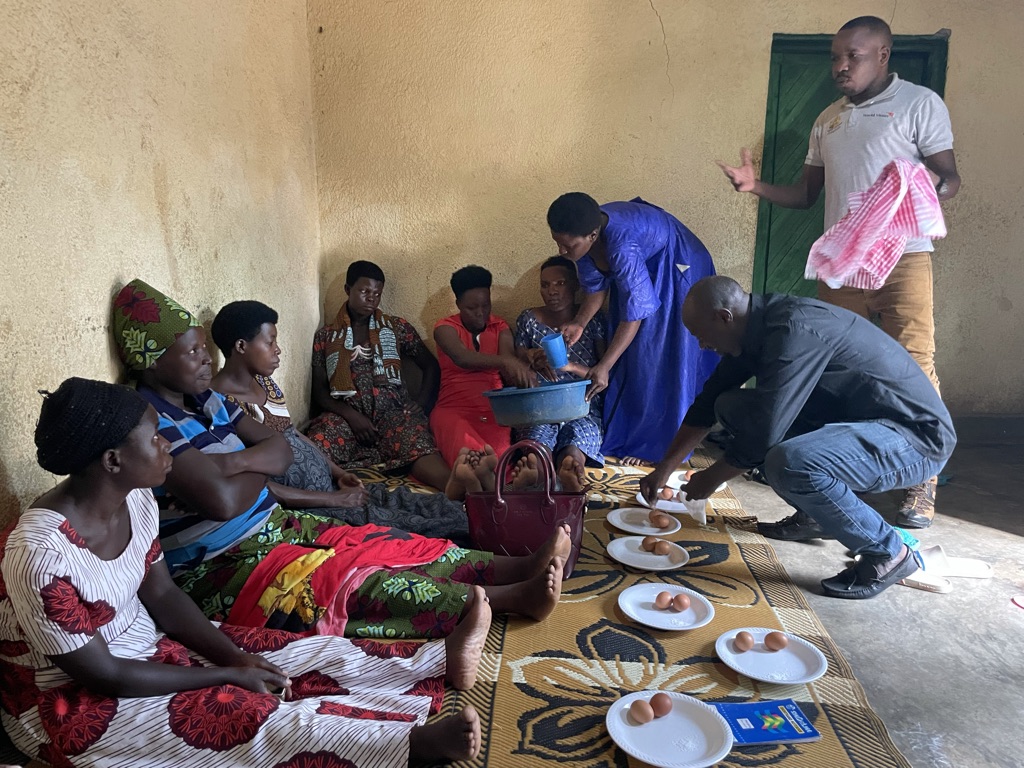The Innovation Lab for Livestock Systems launched a new project in Rwanda to investigate the potential of eggs: Could feeding pregnant women two eggs a day improve their child’s growth and development?
We spoke with Heather Stark, the project’s co-principal investigator, and Chhavi Tiwari, a postdoctoral research associate, to learn more about their work.
In Rwanda, 33% of children are stunted, meaning that they have not reached their growth potential due to disease, poor health, and malnutrition (WHO, 2015). In the district of Nyagatare, where the project was launched, both child and maternal malnutrition rates are high. Stark explained that the first 1000 days after conception are critical to a child’s lifelong development. As such, nutrition during pregnancy is crucial.
The project, “Cracking the Potential of Eggs to Improve Child Growth and Development,” is conducting a randomized control trial to study the effects of maternal egg consumption on birth outcomes, primarily child length at birth. Previous studies have found that feeding children eggs leads to better development outcomes, but no studies have assessed whether feeding eggs to pregnant mothers impacts child development. Tiwari said this study will significantly contribute to a better understanding of the potential of egg supplementation during pregnancy on child growth.

Since the project launched in May, 104 women have been enrolled. With a target of 956 participants, the study will continue to enroll women between 18 and 44 in the first trimester of their pregnancy. Each day, women in the egg group will have two hard-boiled eggs delivered to them, and their consumption of the eggs will be directly observed. The control group maintains its regular diet. Participants will be monitored throughout their pregnancy and until their child is six months old.
From design to implementation, the study has been a collaborative effort with World Vision, the University of Rwanda, and the Rwandan government to foster a thorough understanding of local norms and engaging with local actors. Before launching the study, the team conducted formative research and sought community input, on finalizing the implementation plan and design of the study.
“Even before the study started, we were in consultation with the Rwandan government partners. They were very instrumental in designing the study,” Tiwari said.
Formative research revealed that women would not report their pregnancies at the health center until after their first trimester. Through community mobilization efforts, they raised awareness about the importance of early detection of pregnancies.
Now, pregnant women from the surrounding villages are referred by community health workers to the Ndama Health Centers, where the study is taking place.
“One of the barriers also from formative research was the cost. It can take women a significant amount of time to walk to the health center. So, we have tried to mitigate or reduce that barrier by providing compensation,” Stark said.
Women in both study groups are given health insurance if they are not already insured, transport cost compensation to and from the health center, compensation for their time, daily nutritional messages to build awareness, and fortified blended flour. Additionally, they can keep in contact with study staff through mobile phones.
If the findings of egg consumption during pregnancy on child outcomes are positive, it will encourage the government to develop policies and interventions that facilitate and promote egg consumption across the country.
By Nadia Kusiima.
 4
4
